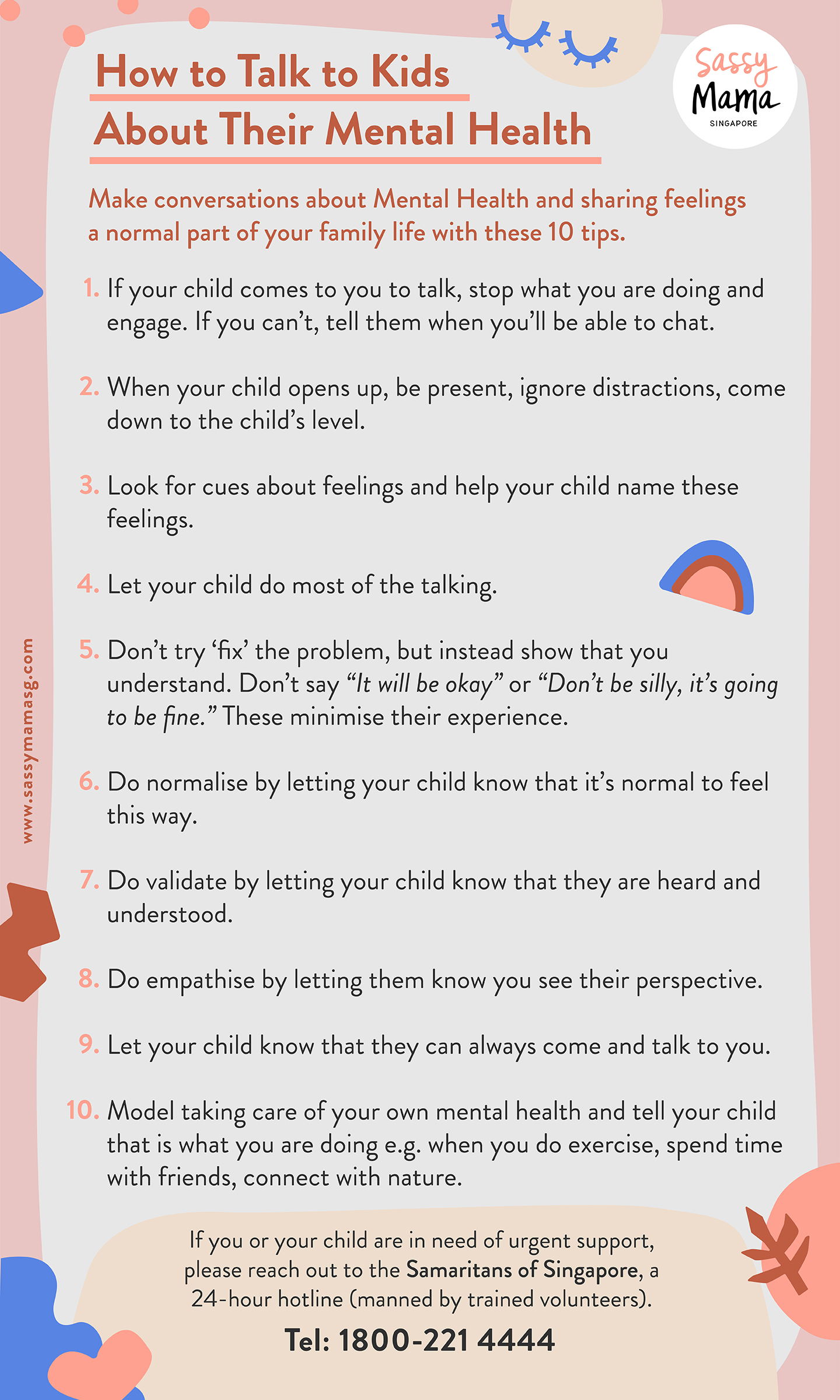
 Post Category - ParentingParenting - Post Category - Older KidsOlder Kids
Post Category - ParentingParenting - Post Category - Older KidsOlder KidsWhether your kids are feeling anxious, stressed or have any other ‘big’ feelings, it helps to know what to look for and how to talk about mental health so that kids can deal with life’s ups and downs with resilience
It’s been a tough year or so! Do you really know how your kids are feeling and coping? Starting up a conversation about how your kids are feeling could be one of the most important things you do this week. School Counsellor Claire Holmes answers some commonly asked questions about raising awareness of Mental Health in your family.
Read more: 17 Recommended Children’s Books to Understand and Manage Big Feelings
What is Mental Health?
Mental Health is about how we see ourselves, others, and the world around us. It’s about how we manage feelings, make choices and cope in stressful situations. Just like Physical Health, our Mental Health can range from us feeling fantastic to not so great and everything in between. Sometimes we might feel on top of things, comfortable in who we are and that we can handle anything. At other times we might experience emotional overwhelm, feeling that it’s hard to cope with everyday life. Everyone has Mental Health and taking care of it is important.
Should I talk about Mental Health?
Yes. It’s never too early to make conversations about Mental Health a normal part of your family life. Encouraging your child to share their feelings helps them understand their emotional landscape, builds resilience, and gives them the confidence to ask for help should they need it. These chats can happen anywhere, in the car, on a walk, or whilst you do an activity together. Model everyday discussion about your own feelings and encourage empathy by talking about how others might feel in real life, books or on stage and screen.
How can I best support my child in conversations on Mental Health?
Here are five helpful tips to help you support your child in talking about their mental health:
- If your child comes to you to talk, stop what you are doing and engage.
- If it’s not possible to do that, tell them when you’ll be able to chat.
- During conversations ‘be there,’ keep eye contact, ignore distractions, come down to the child’s level and keep your body language open and relaxed. As you talk, look for cues about feelings, listening to their words, tone of voice and body language.
- Help your child to name these feelings. Our natural response is to steer away from difficult emotions but calmly staying with what arises helps to get to the heart of the matter, making your child feel heard. Let your child do most of the talking, allow them to tell their story fully. Offer silence to allow them to go deeper.
- Resist the urge to ‘fix’ the problem, show that you understand, value and respect what they are telling you, even if their feelings might be different to yours. Try to avoid telling your child that it will be okay, not to worry or use statements like “you don’t need to be concerned about that” or “don’t be silly, it’s going to be fine.” These minimise their experience and may prevent them from telling you their struggles moving forward.

What if I don’t know what to say?
It’s okay to let your child know that you don’t know how things will turn out but that you know that they can cope and you are here to support them. It’s hard sometimes to keep the conversation moving. When you chat with your child reflect back on the details that you heard and talk about the feelings that they name to keep the conversation flow going. Do listen for your child’s strengths and let them know that you appreciate these. Normalising, validating, and empathising are useful.
Normalise by letting your child know that it’s normal to feel this way, you might say “Everyone has Mental Health, it’s normal to have tough days and feel sad sometimes”.
Validate by letting your child know that they are heard and understood. You might say something like “Gosh, that sounds tough, I can really hear that it’s hard to think straight and calm down.”
Empathise by letting them know you see their perspective, you might say “I know how tough it feels when things are so busy, it’s hard to manage.”
With older children, check in about the helpfulness of the conversation. You might say “I hope that this conversation was helpful? Can I do anything different to support you?” Let me know when you’d like to chat again, I’d really like to help”. This shows that you are figuratively walking alongside them.
What about my teen who doesn’t want to talk?
It can be tricky for older children to talk about how they are feeling and what is bothering them. Offer invitations to talk but be prepared for your child not to be willing at that time. Open questions work best to start conversations, things like “How’s it all going?” “How are you feeling at the moment?” If the time is not right for them, they’ll let you know. So, keeping the door open with a statement like “I’m here to listen if you need it, let me know when that’s right for you.” Some children might need some extra help working out when they need to talk, you might like to agree a strategy that works best for you and your child e.g. “Send me a text with an ok sign” or “write a tick on the white-board outside your room when you want to talk.”
How do I encourage my child to take care of their Mental Health?
Model taking care of your own mental health. Spot times that your child does this too. This might be engaging in exercise, doing something creative, connecting with others, learning a new skill, spending time in nature, showing kindness or gratitude, or taking time for just being. Openly talk about these times as ‘taking care of your Mental Health.’ Encourage your child to tune into their body and mind by getting to know their ‘stress signature’. They may notice things like a tight jaw, heart beating faster, it might be hard to concentrate or their mind might be ‘racing’ when feelings are intense. Noticing these signs helps them to make a choice to engage in one of their coping strategies.
Mental Health Support
Sometimes more help is needed. This may be from a family member, a trusted friend, teacher, school counsellor or a therapist in the community. If you are in need of urgent support, please reach out to the Samaritans of Singapore, a 24-hour hotline (manned by trained volunteers) Tel: 1800-221 4444
Raising awareness of Mental Health from a young age sets up children to deal with life’s ups and downs with resilience and fortitude. It also helps parents keep connected with their own ways of coping too, making taking care of Mental Health a family project that lasts a lifetime.







 View All
View All





 View All
View All









 View All
View All









